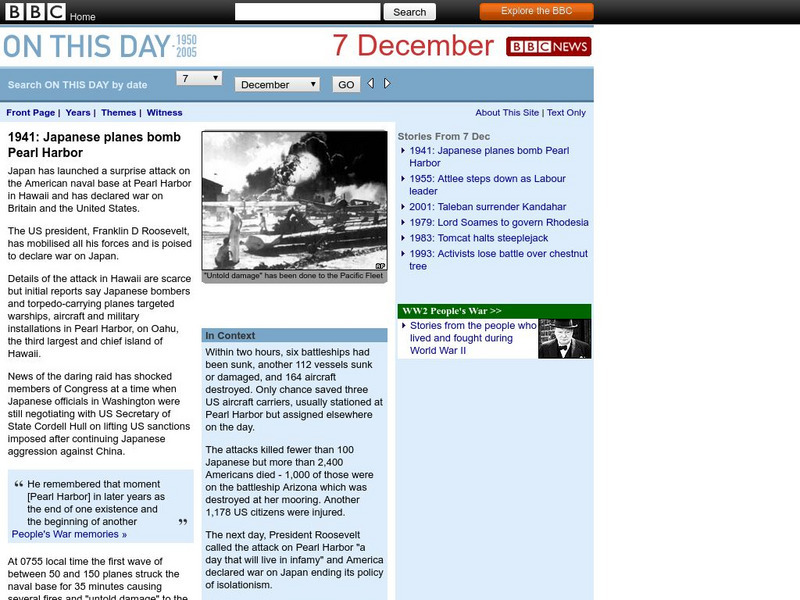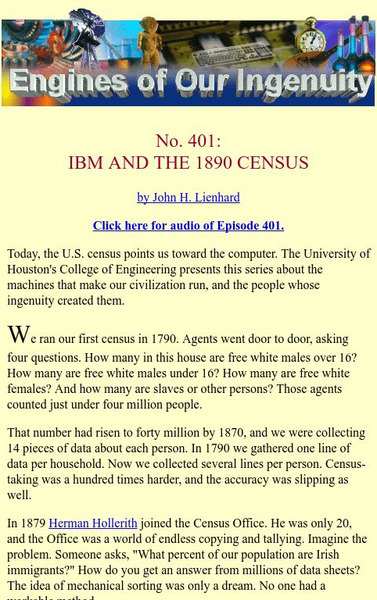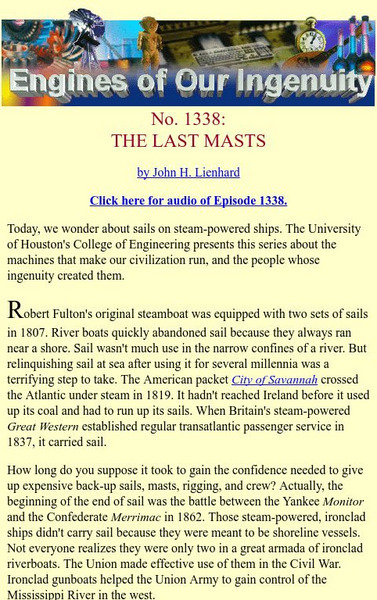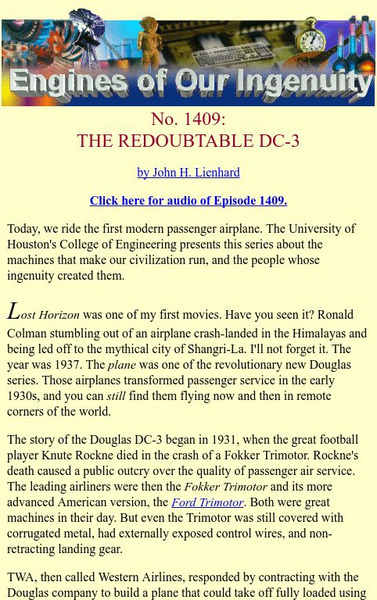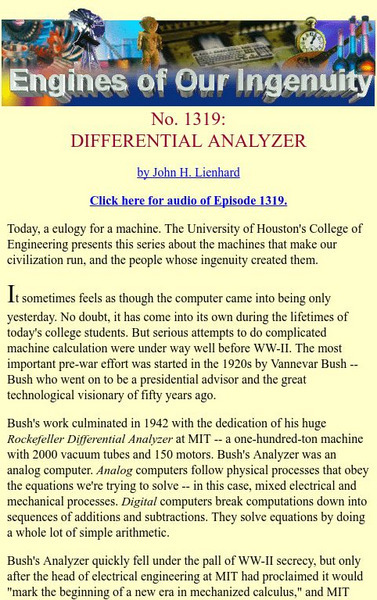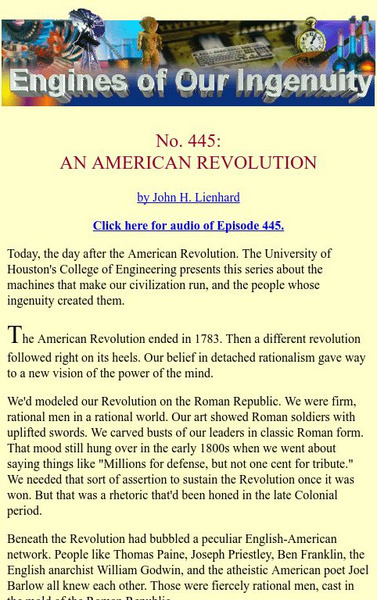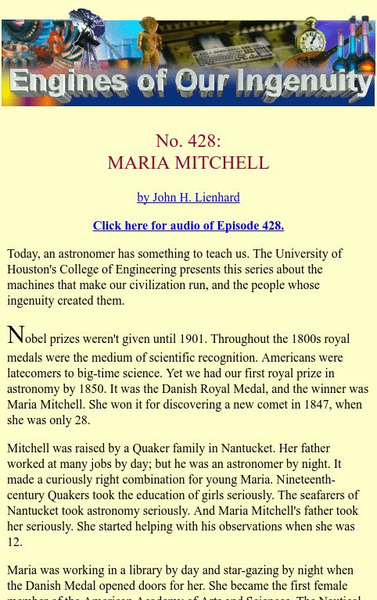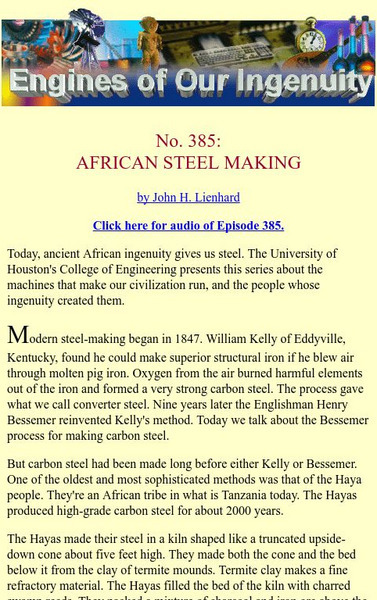Other
Independent Television News: Itn
ITN is your United Kingdom news source. This site features links to ITV news stations, British news, world news, money, sports, weather, and entertaiment.
American Rhetoric
American Rhetoric: Richard M. Nixon: Checkers
This is the text, audio, and video [5:21] of Richard Nixon, Vice Presidential Candidate, addresses the nation on TV on September 23, 1952, explaining the $18,000 he took from a group of his supporters. It is known as the "Checkers" speech.
Library of Congress
Loc: America's Story: Nixon Kennedy Debate
Although Richard Nixon and John F. Kennedy weren't the first presidential candidates to use the media to reach the public, their debates showed most clearly how television could influence the voting public.
Curated OER
Afghans Watch the Live Broadcast of the Loya Jirga
Leader of Afghanistan's struggling transitional administration, he managed to escape the Taliban's attempts on his life. Karzai is attributed with diplomatic skills and strength to pull a war torn nation together.
BBC
Bbc: 1941: Japanese Planes Bomb Pearl Harbor
On This Day is an archive of significant news stories broadcast by the BBC. Link takes you to its report of the bombing of Pearl Harbor broadcast on December 7, 1941. With in-context notes to aid understanding.
University of Houston
University of Houston: Engines of Our Ingenuity: No. 401: Ibm and the 1890 Census
Learn about the history of the Ferris wheel in this transcript of a radio broadcast. In this transcript of a radio broadcast, we learn about Herman Hollerith, who invented a method of quickly tabulating information from the 1890 census...
BBC
Bbc: Simon Schama's Power of Art: Turner
From the BBC's documentary series "Simon Schama's Power of Art," find a synopsis of the broadcast on the English master J. M. W. Turner.
PBS
Pbs Learning Media: Fossils in the Gobi
Biologist Mike Novacek discusses his discovery of mammal fossils in the Gobi Desert and tells us what we can learn from them. From an episode about extinction broadcast on the PBS series "Evolution."
University of Houston
University of Houston: Engines of Our Ingenuity: No. 315: 1909 Sears Roebuck Catalog
An informative article on what Americans could have bought from the Sears-Roebuck catalog back in 1909. This is a transcript of an accompanying radio broadcast.
University of Houston
University of Houston: Engines of Our Ingenuity: No. 702: Trompe L'oeil
A short lecture on trompe l'oeil in art that introduces the concept of realism turned to visual deception in artwork. It explores the great divide in theory between Plato and Aristotle which serves as an epistemological backdrop to the...
University of Houston
University of Houston: Engines of Our Ingenuity: No. 1758: Sinking the Bismarck
A new take on the sinking of the Bismarck. Due to finding the actual sunken ship, possible evidence was procured that may support the idea that the Bismarck was actually scuttled by the Germans. Regardless, the sinking of the Bismarck...
University of Houston
University of Houston: Engines of Our Ingenuity: No. 1373: Pittsburgh in 1816
Pittsburgh had a unique place in the nation after the War of 1812. It was an inland city and a rich source of iron. As such, it needed access to water for transport, and some of the first steamboats were used here. Read more about...
University of Houston
University of Houston: Engines of Our Ingenuity: No. 1420: The Erie Canal
Read about the history of the Erie Canal and the impact it had on the economy in this article, which is a transcript of a radio broadcast.
University of Houston
University of Houston: Engines of Our Ingenuity: No. 1338: The Last Masts
Read about the history of the steamboat and the difficult transition that led to the eventual relinquishing of a ship's sails. This article is a transcript of a radio broadcast.
University of Houston
University of Houston: Engines of Our Ingenuity: No. 1342: Wright and Langley
Read about the controversy that emerged over the authenticity of Samuel Pierpoint Langley's flying machine, and the response of the Wright Brothers to attempts to usurp their place in history. This is a transcript of a radio broadcast.
University of Houston
University of Houston: Engines of Our Ingenuity: No. 1418: The Influence of War
Does war inevitably advance the invention of new technology? Read this explanation of why this commonly held belief may not be true, at least in the example of military aircraft. This is a transcript of a radio broadcast.
University of Houston
University of Houston: Engines of Our Ingenuity: No. 1409: The Redoubtable Dc 3
Read about the success of the DC-3 passenger plane, which went into use in 1936, in overcoming the difficulties such planes had encountered up until then. This is a transcript of a radio broadcast.
University of Houston
University of Houston: Engines of Our Ingenuity: No. 1319: Differential Analyzer
Read about the work of Vannevar Bush, who invented the differential analyzer, an analog computer. This is a transcript of a radio broadcast.
University of Houston
University of Houston: Engines of Our Ingenuity: No. 1393: Inventing the Telegraph
Read about the history of the telegraph in this article, which is a transcript of a radio broadcast.
University of Houston
University of Houston: Engines of Our Ingenuity: No. 445: An American Revolution
After the American Revolution, creativity began to flourish as writers and Romantic poets inspired the nation to re-invent itself. That public sensibility is briefly described in this article, which is a transcript of a radio broadcast.
University of Houston
University of Houston: Engines of Our Ingenuity: No. 428: Maria Mitchell
Read about Maria Mitchell, one of the first female astronomers, in this transcript of a radio broadcast.
University of Houston
University of Houston: Engines of Our Ingenuity: No. 385: African Steel Making
Learn about the Hayas of Africa who made steel thousands of years before modern times. This article is a transcript of a radio broadcast.
University of Houston
University of Houston: Engines of Our Ingenuity: No. 429: The Mismeasure of Man
Read about the work of Louis Agassiz and Samuel Morton, who tried to quantify humans into racial stereotypes. This article is a transcript of a radio broadcast.
University of Houston
University of Houston: Engines of Our Ingenuity: No. 283: Aeronautics: 1869
Learn about the first efforts to build a flying machine in this discussion of a Harper's magazine article from 1869 in this transcript of a radio broadcast.
Other popular searches
- Radio Broadcast
- Broadcast Advances
- Broadcast News
- Broadcast Media
- Teach Broadcast Journalism
- Broadcast Journalism Ethics
- Broadcast Journalism Writing
- 1920s Radio Broadcast
- Broadcast Journalism in War
- Radio Broadcast Script
- Broadcast Journalism Video
- Broadcast Video Production





